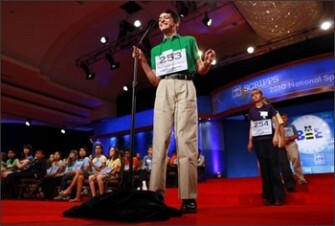Ever since I switched to the curriculum beat at EdWeek in January, I’ve been inundated with news releases about the (seemingly) countless student competitions out there. They run the gamut from robotics competitions to the USA Biology Olympiad, the Intel Science Talent Search, Mathcounts, spelling and geography bees, and on and on. In fact, I keep a file on the subject, figuring I’ll thread them into a story eventually.

Well, former Wall Street Journal education reporter June Kronholz has a new piece in the journal Education Next taking a closer look at the growing interest in such competitions, with a focus on spelling and geography bees, like the Scripps National Spelling Bee.
She writes: “Today’s teachers generally cringe at everything about that development. All those hours spent on one narrow academic focus! All that rote learning! All that stressful competition! And if some children shine on that national stage, what about the self-esteem of every other child whose luster is publicly shown to be not as bright?”
“Good points, perhaps. But they haven’t slowed the apparent growing interest among middle schoolers in the Scripps spell-off or any of the other bees, bowls, and academic olympiads that will climax in national championships this spring.”
As part of her research, Kronholz interviewed a dozen bee contestants. Some of her findings from those conversations may be surprising.
She writes: “The popular image of [spelling and geography] bee contestants, moreover, is that they spend hours on grinding memorization and mind-numbing rote that robs them of time for creative thought and interdisciplinary learning. ... But the kids I talked to saw their bees as a happy experience that broadened their knowledge rather than narrowed it.”
And Kronholz finds that students who came close to winning seemed to quickly bounce back. “Most of the kids I talked with told me that they were proud that they had come so far, not dismayed that they had fallen just short,” she writes.
For an EdWeek take out on competitions in the STEM fields, check out this 2008 story in our annual report, Technology Counts. The story explains that while such academic contests have been a fixture of the U.S. education landscape for decades, they have “increasingly been seen as a tool [to improve student achievement] that schools should not overlook.”
Photo: Matthew Zisi, 13, of Fredericksburg, Va., celebrates after spelling his word correctly in the third round of the 2010 Scripps National Spelling Bee on June 3 in Washington. Jacquelyn Martin/AP